Goodwill Forgiveness Letter
[Your Name]
[Your Address]
[City, State, ZIP Code]
[Email Address]
[Phone Number]
[Date]
[Recipient's Name]
[Recipient's Title]
[Company Name]
[Company Address]
[City, State, ZIP Code]
Subject: Request for Goodwill Forgiveness
Dear [Recipient's Name],
I hope this letter finds you well. I am writing to respectfully request your consideration for goodwill forgiveness regarding my recent [mention the reason for your request, e.g., late payment, missed installment, etc.] on my account with [Company Name]. I understand the importance of meeting my financial obligations and maintaining a positive relationship with your esteemed organization, and I sincerely apologize for any inconvenience my actions may have caused.
I would like to provide some context for the situation. [Briefly explain the circumstances that led to the issue, e.g., unexpected financial hardship, medical emergency, etc.]. Despite the challenges I faced, I am committed to resolving this matter and ensuring that my account is brought up to date as soon as possible.
I greatly value my relationship with [Company Name] and have been a loyal customer for [mention the duration of your association, if applicable]. The excellent service and support I have received from your team have reinforced my appreciation for your organization, and I am hopeful that you might consider showing goodwill in this situation.
If granted, this act of goodwill would not only alleviate my immediate financial burden but also allow me to continue my positive relationship with [Company Name]. I am committed to making a sincere effort to fulfill my financial obligations and promptly rectify the situation.
I kindly request your understanding and compassion in this matter. I am dedicated to making amends and proving that this unfortunate incident is an exception rather than a reflection of my commitment to responsible financial conduct.
Thank you for taking the time to consider my request. I am more than willing to discuss this matter further and explore potential solutions that would be mutually beneficial. Please feel free to reach out to me at [your phone number] or [your email address].
Once again, I apologize for any inconvenience I may have caused, and I am hopeful for a positive resolution. Thank you for your time and attention.
Sincerely,
[Your Full Name]
[Your Account Number (if applicable)]
[Your Signature (if sending a physical letter)]
---
Please note that this is a template and should be customized to your specific situation. Be sincere, polite, and concise in your letter. Additionally, consider any guidelines or requirements provided by the recipient company for goodwill forgiveness requests.
Formal Goodwill Forgiveness Letter to a Bank
Subject: Request for Goodwill Adjustment
Dear [Bank Manager's Name],
I am writing to request a goodwill adjustment regarding [specific account, loan, or credit card] due to [reason, e.g., an unexpected financial hardship or late payment]. I sincerely apologize for the oversight and assure you that it was an isolated incident.
I have been a loyal customer of [Bank Name] for [number] years and have always maintained my account responsibly. I kindly request that the negative mark or late fee be removed as a gesture of goodwill. This adjustment would significantly help me maintain my financial standing and continue our positive relationship.
Thank you very much for considering my request. I truly appreciate your understanding and assistance.
Sincerely,
[Your Name]
Goodwill Forgiveness Letter to a Friend
Subject: Asking for Forgiveness
Dear [Friend's Name],
I hope you are doing well. I wanted to reach out and apologize for [specific incident or behavior]. I realize that my actions may have hurt you, and I deeply regret that.
Our friendship means a lot to me, and I hope we can move past this situation. I ask for your understanding and forgiveness, and I promise to make amends in any way I can. Your trust and friendship are important to me, and I truly hope we can rebuild that.
Thank you for considering my apology.
Warm regards,
[Your Name]
Goodwill Forgiveness Letter for Academic Institution
Subject: Request for Goodwill Forgiveness on [Fee/Charge]
Dear [Administrator’s Name],
I am writing to request goodwill forgiveness for [specific fee, late submission, or penalty] due to [reason, e.g., unforeseen circumstances, illness, or family emergency]. I sincerely regret any inconvenience caused by this situation.
I have always strived to meet all academic obligations and maintain a positive record at [School/University Name]. I kindly request that you consider waiving this charge as a gesture of goodwill. Your understanding would greatly support my continued commitment to my studies.
Thank you for your time and consideration.
Sincerely,
[Your Name]
Goodwill Forgiveness Letter for Employer or Workplace
Subject: Request for Goodwill Forgiveness
Dear [Supervisor/HR Manager's Name],
I am writing to formally apologize for [specific incident, e.g., missed deadline, error, or misunderstanding]. I take full responsibility and assure you that I am taking steps to ensure it does not happen again.
Given my consistent track record and commitment to [Company Name], I am requesting goodwill forgiveness for this incident. I value my position and our professional relationship and hope we can move forward positively.
Thank you for your understanding and consideration.
Best regards,
[Your Name]
Goodwill Forgiveness Email for Service Provider
Subject: Request for Goodwill Adjustment
Dear [Service Provider Name],
I hope this message finds you well. I am reaching out to request a goodwill adjustment regarding [specific service, payment, or issue] due to [reason, e.g., unexpected circumstances or misunderstanding]. I sincerely apologize for any inconvenience this may have caused.
I have been a loyal customer and truly value the services provided. I kindly ask that you consider forgiving or adjusting [the charge/issue] as a gesture of goodwill. Your understanding would mean a great deal to me.
Thank you for your time and assistance.
Sincerely,
[Your Name]
Goodwill Forgiveness Letter for Insurance Claim
Subject: Request for Goodwill Forgiveness on Claim or Penalty
Dear [Insurance Agent/Manager],
I am writing to request your consideration for goodwill forgiveness regarding [specific claim, penalty, or fee] associated with my policy [Policy Number]. Due to [reason, e.g., an unexpected situation or error], I was unable to [meet payment, submit documentation, etc.].
I have maintained my insurance policy responsibly and have been a loyal customer. I kindly request that you consider waiving or adjusting this matter as a goodwill gesture. Your support and understanding would be greatly appreciated.
Thank you very much for reviewing my request.
Sincerely,
[Your Name]
Heartfelt Goodwill Forgiveness Letter to Family Member
Subject: Seeking Forgiveness
Dear [Family Member's Name],
I hope you can take a moment to read this message. I want to sincerely apologize for [specific action or situation] and any pain it may have caused you. My intentions were never to hurt you, and I deeply regret the impact of my actions.
Family is incredibly important to me, and I hope we can move forward with understanding and love. I ask for your forgiveness and am willing to do what it takes to make things right. Your forgiveness would mean the world to me.
With love,
[Your Name]
Quick Goodwill Forgiveness Note
Subject: Request for Forgiveness
Hi [Recipient's Name],
I just wanted to say I am sorry for [specific incident]. It was never my intention to cause any trouble or hurt. I hope you can forgive me.
Thanks for considering,
[Your Name]
What is a goodwill forgiveness letter and why is it important?
A goodwill forgiveness letter is a formal or informal message requesting leniency, adjustment, or pardon for a mistake, fee, penalty, or personal misstep. Its purpose is to appeal to the recipient’s understanding, emphasizing sincerity, responsibility, and past positive behavior. Such letters can maintain relationships, resolve disputes, or remove negative consequences.
Who should send a goodwill forgiveness letter?
- Customers requesting fee waivers from banks, service providers, or insurance companies.
- Employees or colleagues requesting forgiveness for workplace mistakes.
- Students or parents seeking academic leniency.
- Friends or family members seeking personal forgiveness.
- Individuals involved in disputes where goodwill can restore trust.
To whom should a goodwill forgiveness letter be addressed?
- Bank managers or financial officers.
- Supervisors, HR representatives, or employers.
- Academic administrators or instructors.
- Service providers, insurance agents, or vendors.
- Friends, family members, or personal acquaintances.
When is a goodwill forgiveness letter appropriate?
- After a late payment, fee, or penalty.
- Following a professional or personal mistake.
- When seeking reconciliation in relationships.
- During unforeseen circumstances affecting obligations.
- When goodwill adjustments or leniency can prevent escalation of a conflict.
How to write and send a goodwill forgiveness letter
- Begin with a clear subject and direct greeting.
- Briefly describe the situation and acknowledge responsibility.
- Express genuine remorse or regret.
- Provide context, including past positive behavior or loyalty.
- Politely request forgiveness, adjustment, or leniency.
- Close respectfully, offering willingness to make amends if needed.
- Send via email for quick response or as a printed letter for formal cases.
How many goodwill forgiveness letters are typically sent?
- Usually, one well-written letter suffices.
- In cases with multiple parties or institutions, a letter may be sent to each relevant recipient.
- Follow-up letters can be sent if no response is received after a reasonable period.
Requirements and prerequisites before writing a goodwill forgiveness letter
- Identify the specific issue or fee to address.
- Gather evidence or records demonstrating prior good conduct.
- Reflect on the tone and language appropriate for the recipient.
- Be prepared to provide additional documentation if requested.
Formatting guidelines for a goodwill forgiveness letter
- Length: 1 page or less for clarity and conciseness.
- Tone: Sincere, polite, and respectful; formal for institutions, heartfelt for personal matters.
- Structure: Greeting, explanation, acknowledgement of responsibility, request, closing.
- Mode: Printed letter for formal requests, email for casual or quick appeals.
- Etiquette: Avoid blaming, remain humble, and emphasize good intentions.
Pros and cons of sending a goodwill forgiveness letter
Pros
- Can remove penalties or fees.
- Helps preserve personal and professional relationships.
- Demonstrates accountability and sincerity.
Cons
- May be denied if the request is not compelling.
- Could appear insincere if poorly written.
- Requires careful wording to avoid misunderstandings.
Common mistakes to avoid in goodwill forgiveness letters
- Failing to acknowledge responsibility.
- Using an overly demanding or entitled tone.
- Being vague about the situation.
- Sending multiple redundant letters too quickly.
- Neglecting to proofread for errors or clarity.
Elements and structure every goodwill forgiveness letter should include
- Subject line or heading.
- Polite greeting addressing the recipient.
- Clear description of the issue or incident.
- Acknowledgment of responsibility.
- Expression of regret or remorse.
- Context highlighting prior positive behavior or loyalty.
- Request for forgiveness, adjustment, or leniency.
- Closing with gratitude and signature.
Follow-up actions after sending a goodwill forgiveness letter
- Confirm receipt with the recipient if appropriate.
- Be prepared to provide supporting documentation.
- Respond promptly to any questions or clarification requests.
- Maintain a courteous and patient tone while awaiting a reply.
- Express gratitude once the request is granted or considered.
Tricks and tips for an effective goodwill forgiveness letter
- Keep it concise and focused.
- Highlight past loyalty or positive behavior.
- Be sincere and avoid exaggeration.
- Personalize the letter to the recipient and context.
- Use bullet points for complex issues when appropriate.
- Send at an appropriate time, allowing the recipient to consider the request calmly.

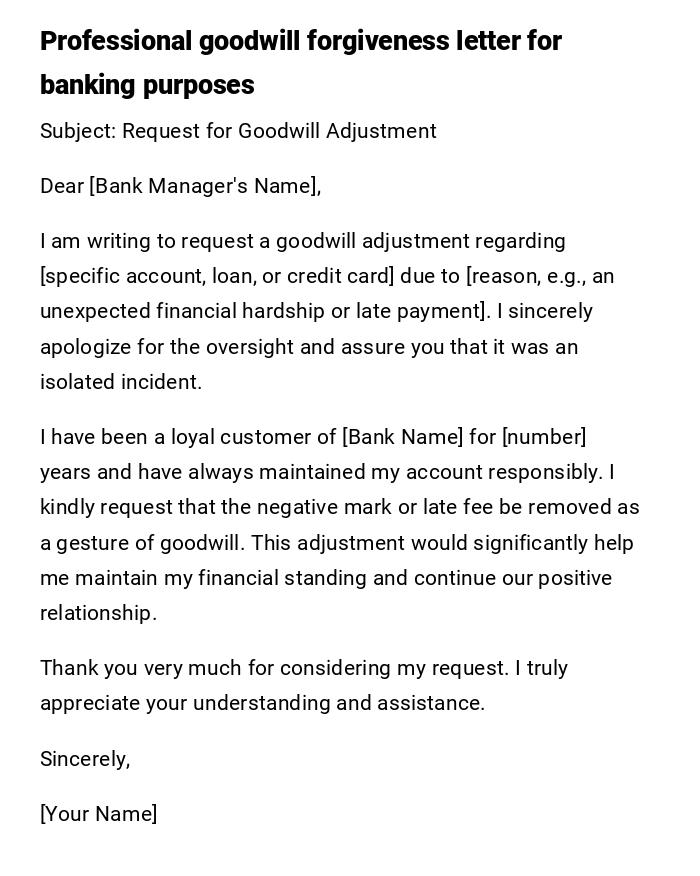
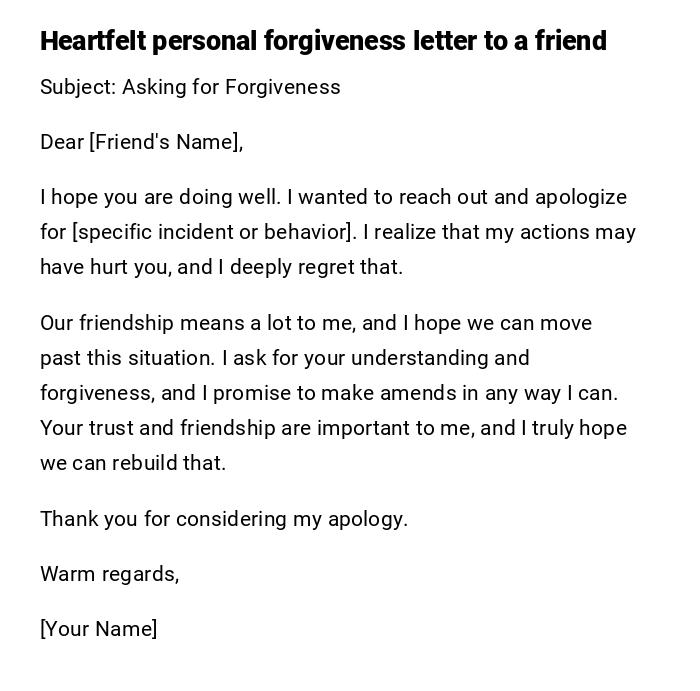
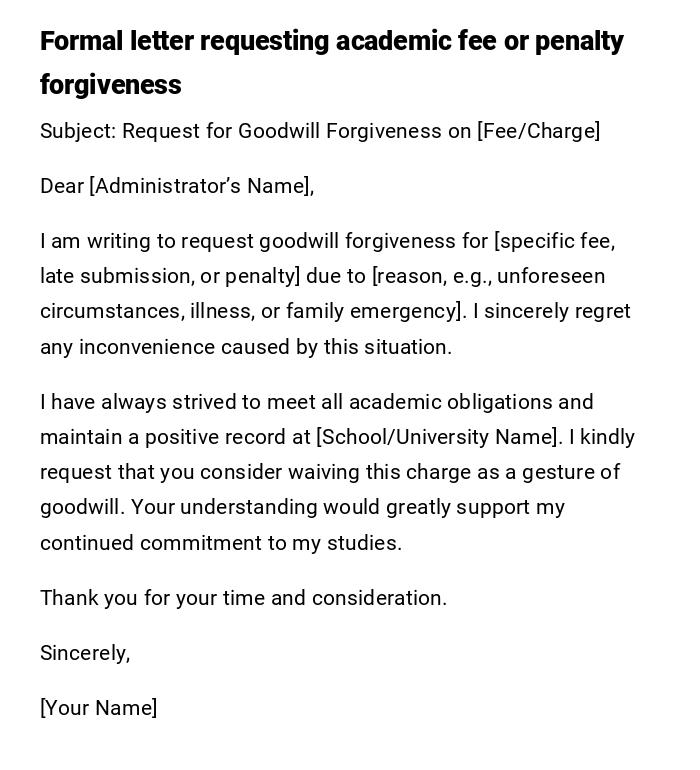
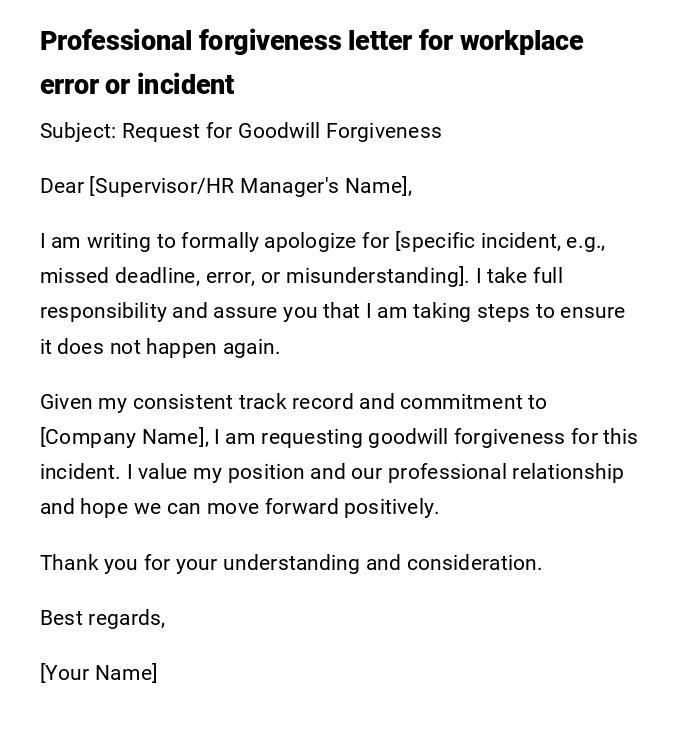
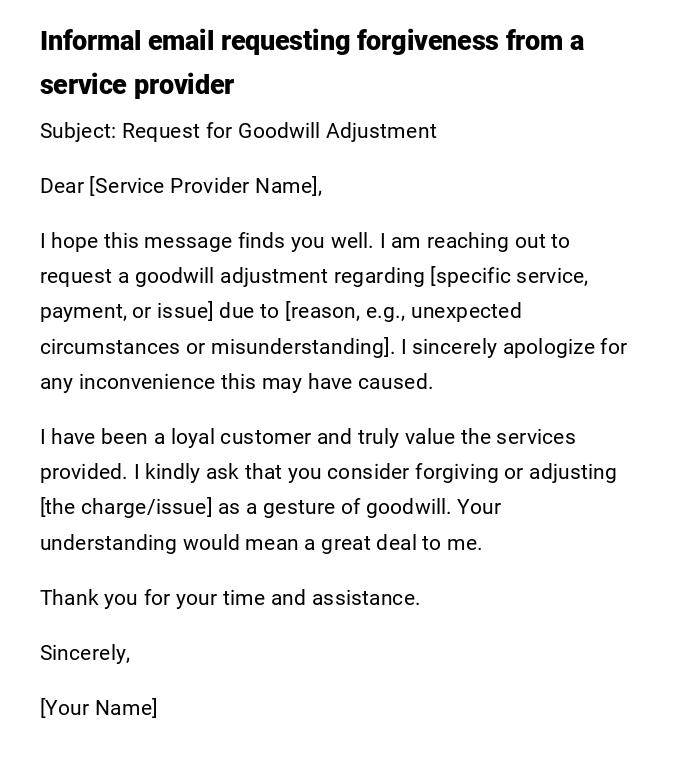
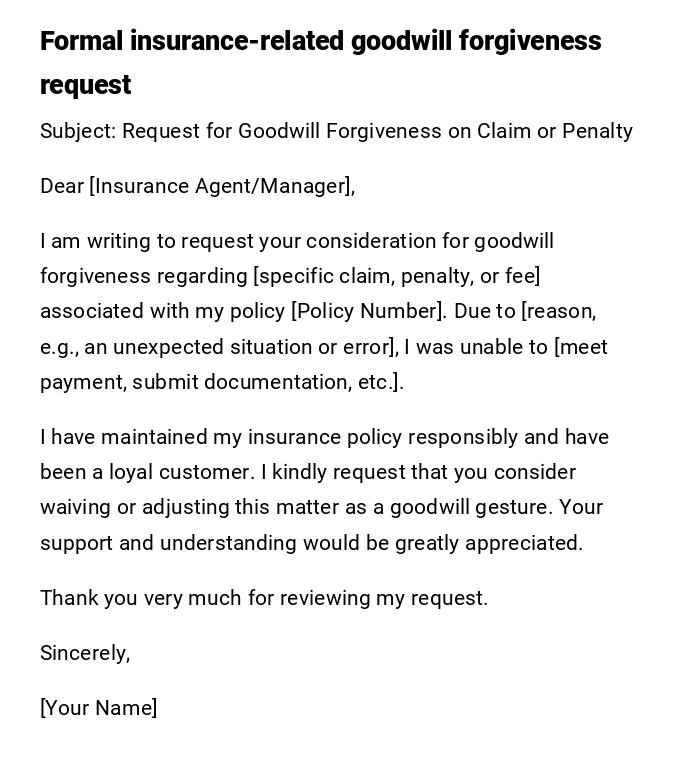
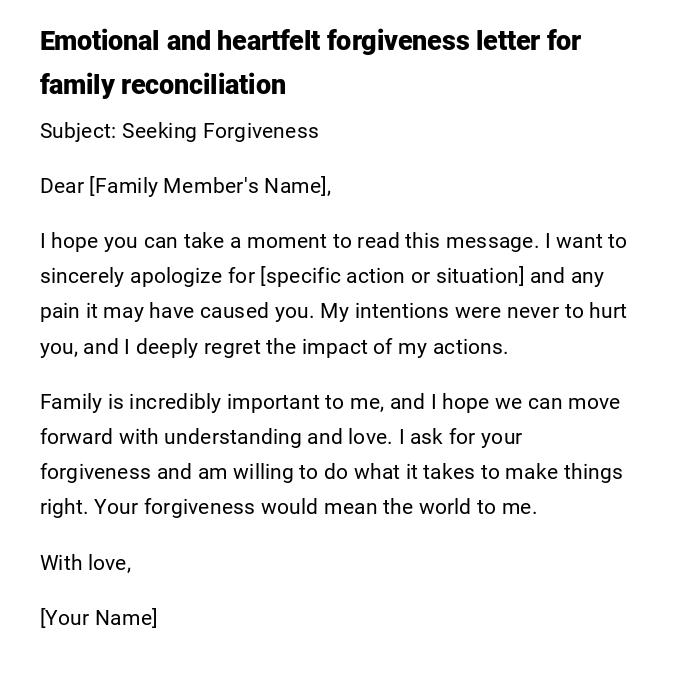
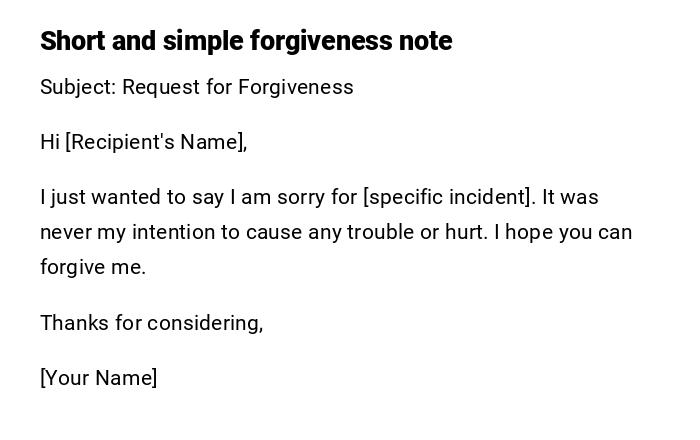

 Download Word Doc
Download Word Doc
 Download PDF
Download PDF